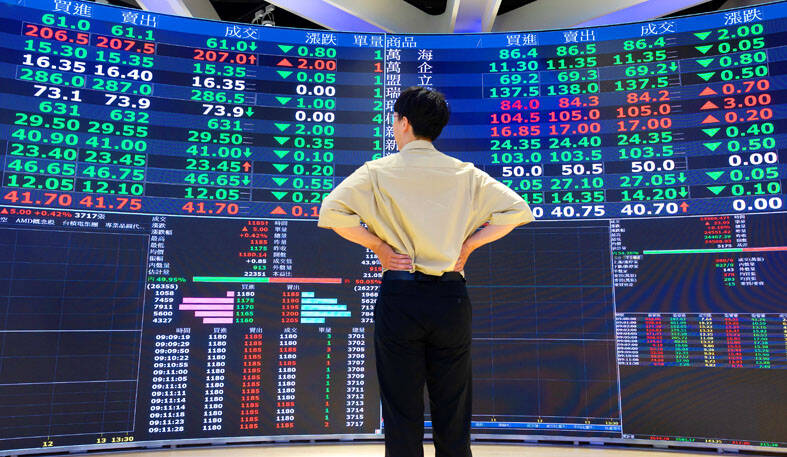Taiwanese shares closed at a new high yesterday, with artificial intelligence (AI)-related stocks in focus as investors bet that US-based AI chip designer Nvidia Corp would provide positive leads in its upcoming investor conference.
The TAIEX ended up 214.80 points, or 0.88 percent, at 24,519.90, an all-time closing high. Nvidia supplier Taiwan Semiconductor Manufacturing Co (TSMC, 台積電), the world’s largest contract chipmaker, gained 1.28 percent, after its American depositary receipts rose 1.33 percent overnight.
“The US markets recovered from the day’s lows, as Nvidia shares steamed ahead before its results,” Moore Securities Investment Consulting Co (摩爾投顧) analyst Adam Lin (林漢偉) said, referring to a 1.08 percent increase in Nvidia shares overnight.

Photo: CNA
“It seemed that investors were upbeat about AI development, expecting Nvidia to give positive leads,” Lin said. “Such optimism spread to the local main board, prompting investors here to pick up AI-related stocks, led by TSMC.”
Other AI-related stocks also moved higher. AI server maker Quanta Computer Inc (廣達電腦) rose 1.51 percent, rival Wistron Corp (緯創) added 1.77 percent, power management solution provider Delta Electronics Inc (台達電子) gained 5.11 percent and cooling solution supplier Asia Vital Components Co (奇鋐科技) advanced 2.44 percent.
Bucking the upturn, iPhone assembler and AI server producer Hon Hai Precision Industry Co (鴻海精密), also known as Foxconn Technology Group (富士康科技集團), ended down 0.48 percent.
“Military concept” stocks continued to benefit from optimism over sales following the government’s announcement of plans to increase defense spending next year, Lin said.
Drone manufacturer Thunder Tiger Corp (雷虎科技) soared 10 percent, Lungteh Shipbuilding Co (龍德造船) rose 5.76 percent and aircraft maintenance service provider Air Asia Co (亞洲航空) advanced 5.79 percent.
“Turnover stayed at a relatively high level, indicating investors were willing to chase prices,” Lin said. “As a result, old-economy industries also attracted buying, adding momentum to the TAIEX.”
Turnover on the main board totaled NT$454.649 billion (US$14.87 billion) yesterday, compared with NT$514.013 billion in the previous session, Taiwan Stock Exchange data showed.
“After today’s rally, the TAIEX has moved closer to the historical intraday high of 24,551.42 [on Tuesday last week],” Lin said. “Investors should pay close attention to how the US markets react to Nvidia’s results and guidance, which will influence tech stocks here.”
Nvidia is to report second-quarter financial results early today, closely watched as a bellwether for the industry as worries about a tech bubble rise. The AI giant is also expected to provide clues on how the US-China rivalry is limiting growth.
“The company has outgrown the tech sector and become the market’s lodestar,” SPI Asset Management managing partner Stephen Innes wrote in a note.
“Analysts expect revenue to soar 53 percent to US$46 billion, but this is about more than revenue beats,” he added. “The crowd wants reassurance that the AI revolution isn’t just smoke and mirrors.”
Additional reporting by AFP

In Italy’s storied gold-making hubs, jewelers are reworking their designs to trim gold content as they race to blunt the effect of record prices and appeal to shoppers watching their budgets. Gold prices hit a record high on Thursday, surging near US$5,600 an ounce, more than double a year ago as geopolitical concerns and jitters over trade pushed investors toward the safe-haven asset. The rally is putting undue pressure on small artisans as they face mounting demands from customers, including international brands, to produce cheaper items, from signature pieces to wedding rings, according to interviews with four independent jewelers in Italy’s main

Japanese Prime Minister Sanae Takaichi has talked up the benefits of a weaker yen in a campaign speech, adopting a tone at odds with her finance ministry, which has refused to rule out any options to counter excessive foreign exchange volatility. Takaichi later softened her stance, saying she did not have a preference for the yen’s direction. “People say the weak yen is bad right now, but for export industries, it’s a major opportunity,” Takaichi said on Saturday at a rally for Liberal Democratic Party candidate Daishiro Yamagiwa in Kanagawa Prefecture ahead of a snap election on Sunday. “Whether it’s selling food or

CONCERNS: Tech companies investing in AI businesses that purchase their products have raised questions among investors that they are artificially propping up demand Nvidia Corp chief executive officer Jensen Huang (黃仁勳) on Saturday said that the company would be participating in OpenAI’s latest funding round, describing it as potentially “the largest investment we’ve ever made.” “We will invest a great deal of money,” Huang told reporters while visiting Taipei. “I believe in OpenAI. The work that they do is incredible. They’re one of the most consequential companies of our time.” Huang did not say exactly how much Nvidia might contribute, but described the investment as “huge.” “Let Sam announce how much he’s going to raise — it’s for him to decide,” Huang said, referring to OpenAI

The global server market is expected to grow 12.8 percent annually this year, with artificial intelligence (AI) servers projected to account for 16.5 percent, driven by continued investment in AI infrastructure by major cloud service providers (CSPs), market researcher TrendForce Corp (集邦科技) said yesterday. Global AI server shipments this year are expected to increase 28 percent year-on-year to more than 2.7 million units, driven by sustained demand from CSPs and government sovereign cloud projects, TrendForce analyst Frank Kung (龔明德) told the Taipei Times. Demand for GPU-based AI servers, including Nvidia Corp’s GB and Vera Rubin rack systems, is expected to remain high,